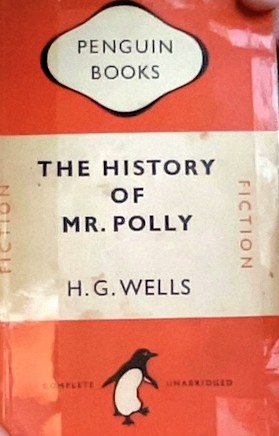Inspiring Older Readers
 posted on 14 Oct 2024
posted on 14 Oct 2024
The History of Mr Polly by H.G. Wells
Over the past couple of months I have been rereading a lot of modernist fiction – the kind of thing that is written in what I recently saw described as ‘the high aesthetic mode’, that prose style that rejects the formal conventions of narrative fiction, such as speech marks, stable tenses, and straightforward chronology, and which embraces ambiguity, doubt, unreliable narrators, and long, slippery sentences.
Sometimes I relish this kind of bracingly austere and demanding literature, but at other times, especially when I have read too much of it, it drives me to distraction and I find myself longing for what I always think of as a good old-fashioned ‘brown’ novel – by which I mean a proper story told clearly and entertainingly and movingly. (Was it Virginia Woolf who coined the term ‘brown novels’ to disparage those she regarded as the older generation of stolid male realists such as Bennett, Wells and Galsworthy? I think so.) Anyway, what I needed was Edwardian fiction and I returned to H.G. Wells’s 1910 novel, The History of Mr Polly.
Mr Polly is a poor, largely uneducated working class man – or possibly lower-lower-lower-middle class, as he is a shop-keeper – who has become disenchanted with life: his hasty, ill-advised marriage, his failing gentleman’s outfitters in Fishbourne – ‘…even the absence of book-keeping and a total inability to distinguish between capital and interest could not blind him for ever to the fact that the little shop in the High Street was not paying’ – his neighbours, sometimes it seemed even the very air he must breath. He is profoundly unhappy, dyspeptic, and lonely. He knows that for many life can and does offer more and that it can be happier. But not for people like him. He can scarcely articulate his dissatisfaction let alone address it and is clearly heading toward what we would now call a mid-life crisis.
If that sounds dull or pedestrian then prepare to be surprised. Wells is on record as saying that if not his best book this was certainly his happiest and what marks it out is its wonderful language, its humour and above all Wells’s warm, human sympathy for Mr Polly and for people like him, condemned by social class and poor education to a life of unfulfilled potential. A similar novel today would probably be unbearably pious. But that is not Wells’s way: while he never loses sight of the social causes that contribute to Mr Polly’s distress, his primary aim is to explore these in a novel that is at times ravishingly lovely (its descriptions of an idyllic rural England into which Mr Polly seeks to disappear), sometimes exciting (the fire that destroys Mr Polly’s shop), and unflaggingly, unfailingly funny, with a wry, comic intelligence.
I won’t give too much of the plot away because I think Mr Polly is best approached fresh, relished for its story as much as for its underlying concerns. But I will say that in fleeing the circumstances that are reducing him to misery he will find a kind of Eden, but he will also find that this Eden must be fought for and its inhabitants protected if he is to ever look himself in the face again. The question is whether the feckless Mr Polly can rise to such a challenge.
It may be a relatively slight book in Wells’s vast opus but I was reminded of how influential a book it has been. It continues a tradition of late-Victorian and Edwardian comic writing about the ‘little man’ and has echoes of the Grossmiths’ Diary of a Nobody and Jerome K Jerome’s Three Men in a Boat. But in turn Wells has influenced a wide variety of other writers and I think Mr Polly’s presence can be felt in P.G. Wodehouse, in Orwell’s Coming Up for Air (reviewed here), and in Flann O’Brien’s The Third Policeman which features an almost sentient bicycle which must surely have been inspired by the increasingly ‘senile’ bicycle owned by Mr Polly – it throws him amongst the ironmongery outside Mr Rusper’s shop, causing a rupture in relations between the neighbours that lasts for fifteen years.
Most importantly, however, I think there is an awful lot of Wells himself in Mr Polly, and that his gentle satire of the hapless shop-keeper is also self-satire. In one remarkable passage Wells invents a self-righteous blowhard – complete with gold pince-nez and a desk near the window in the Reform Club’s ‘beautiful library’ – from whom he quotes at length explaining why so many lower-middle class people who might otherwise be justifiably considered ‘unemployed and unemployable’ gravitate to shop-keeping, unaware ‘that the day when a man might earn an independent living by unskilled or practically unskilled retailing has gone for ever’. One can’t help feeling that Wells was lampooning a very specific type of reforming know-all, perhaps himself included.
The History of Mr Polly was exactly what I wanted, at exactly the right moment. A marvellous book to read and to return to.
Alun Severn
October 2024